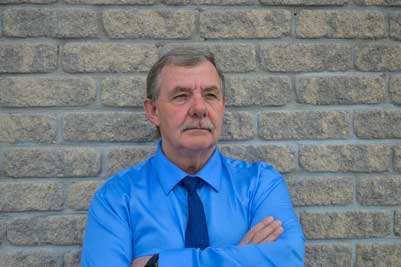One way or another, particularly in rural and Northern areas of Canada such as Manitoulin Island, a great deal of traditional energy from fossil fuel sources is used in home heating and transportation across the substantial distances that many citizens need to travel for work and for social activities.
The costs of transitioning from fossil fuels to “greener” alternatives are prohibitive to most residents of rural areas like ours.
If your party is successful in forming the next government in Ottawa following the October 21 general election, what measures will it put in place, if any, to make it easier for Canadians, many of whom are already struggling to pay their bills, to assist them in moving further away from fossil fuels in the key areas of home heating and transportation?
Heather Wilson
Liberal Party of Canada

In Algoma-Manitoulin-Kapukasing we often have to listen to politicians in southern Ontario as they tell us how we need to live here in Northern Ontario. Those of us that live here know that opting for public transportation is usually not an option and tapping into the natural gas line that goes past our house is also not an option for many of us. So, when we have a strong voice at the table your voice will be heard and we can have made-in-the-North solutions.
The recently announced Liberal plan recognizes that retrofitting existing homes is one of the most effective ways to slash energy bills, create jobs, reduce pollution and make our homes more comfortable. Over the past four years, we made investments to encourage new homes to be built carbon neutral, and to make new and existing affordable housing more energy efficient, while supporting upgrades to community buildings to help cut energy costs and support our climate action goals.
A re-elected Liberal government will continue to make life more affordable for Canadians as they adapt to the rising costs associated with a changing climate. Homeowners and landlords will have access to interest-free loans from CMHC (Canada Mortgage and Housing Corporation) to make investments in things like high-energy furnaces, air source heat pumps, insulation and high efficiency windows thereby cutting energy waste and saving money.
Our plan, unlike others, helps homeowners and renters alike and does not require waiting for the benefit and will be in place for five years.
I know that many homes burn wood in Northern Ontario. I spoke to a gentleman recently that had just converted his wood stove to a pellet stove with a catalytic converter and the reduction in pollution and the increase in efficiency was drastic. Our plan supports buying wood stoves with catalytic converters or adding a catalytic convertor to an existing wood stove that can decrease the amount of wood burned by 30 percent and decrease pollution by 90 percent.
My husband and I burned wood in our first home because it was our only option and we were surrounded by dense bush where we could sustainably harvest the wood we burned. With options like high efficiency pellet stoves and innovation that increases efficiency and decreases pollution our options are better than ever for Northern solutions that address climate change and save money.
Green alternatives for transportation in Northern Ontario is a burgeoning industry. What I have learned while travelling around this massive, great riding is that we have an innovative and entrepreneurial spirit that is second to none. That is why, should I be elected on October 21, we will have a seat in a governing party where we can have made-in-the-North solutions. Currently, on the Highway 11 corridor, for example, Flex, a door to door public shuttle is set to begin in October.
Not all of us can afford to trade in our current vehicle for an electric car nor does the technology currently address our needs for vehicles that take us long distances as well as deal with Northern Ontario winters that see varying levels of snow and ice. A re-elected Liberal government acknowledges that in the absence of substantial greenhouse gas policies we are unlikely to stop relying on fossil fuels as the primary source of energy. In fact, if we do nothing at this point by 2040 fossil fuels will account for 79 percent of total energy supply. We already know that status quo is not an option if we are to prevent catastrophic changes in our climate. A re-elected Liberal government will be striking the best balance between addressing the drastic effects of climate change while also addressing the needs of Northern Ontarians.
Dave Williamson
Conservative Party of Canada

In Algoma-Manitoulin-Kapuskasing public transportation is rarely available, so using our vehicles is a requirement of daily living, not optional as it might be in some larger urban centers. As a result we are suffering under the increased tax burden created by the Federal Carbon Tax. A Conservative government will immediately cancel the carbon tax which will reduce the price of gas by around 4.6 cents per litre and the cost of home heating oil by around 5.4 cents per litre. In addition, a Conservative government will remove the GST from home heating oil allowing taxpayers to keep even more money in their pockets every month.
A Conservative government will also introduce the Green Homes Tax Credit, a two-year plan that will encourage Canadians to improve their homes with emissions reducing technologies.
In 2017, emissions from buildings accounted for 12 percent of Canada’s total greenhouse gas emissions. We cannot tackle climate change without making our buildings greener. With the Green Homes Tax Credit, Canadians will be eligible to receive a 20 percent refundable credit on their income tax for green improvements to sell their homes of over $1,000 and up to $20,000. This will allow Canadians to save up to $3,800 on their green renovations in each year.
The Conservative plan is a plan that will mean real results for Canadians and their families.
Carol Hughes
New Democratic Party

Climate change is an enormous concern for Canadians and building a low carbon economy will require special consideration to make sure households aren’t paying the freight. Here in the North, it’s already expensive enough to heat our homes and get around. The last thing New Democrats will do is make that worse for people as we transition to a low carbon economy.
That said, we’re facing climate-related disasters with increasing frequency, and our Arctic is heating up three times as fast as anywhere else. Adding to the urgency, Canada is on pace to meet our 2030 international climate commitments 200 years from now.
The good news is that solutions are already being developed and will become cheaper as technology and manufacturing are refined. We’re rapidly moving towards a future where vehicles produce dramatically less emissions. If we make the right choices now, we can create good jobs and build the vehicles and transit infrastructure we need to keep Canadians moving.
New Democrats will modernize and expand public transit in communities across Canada ensuring federal transit funding flows with an emphasize low-carbon transit projects, like zero-emissions buses and electric trains. Our goal is to electrify transit and other municipal fleets by 2030.
New Democrats also recognize that Canadians living in rural areas need affordable, convenient transit options that they can rely on, too. We’ll re-establish rural bus routes abandoned by Greyhound and expand bus service in rural regions while helping restore passenger rail service on routes like the Algoma Passenger Train and the Ontario Northland Railway.
To help Canadians who want to do their part, we’ll make it easier to get and use a zero-emissions vehicle (ZEV), and make sure that more ZEVs are built right here. We’ll make it possible for Canadian auto manufacturers to produce more ZEVs, safeguarding good jobs, and strengthening our auto sector, while building towards ZEVs being 100 percent of new car sales by 2040.
A New Democrat government will extend federal incentives for ZEVs by waiving the federal sales tax on purchases, and grow incentives up to $15,000 per family for made-in-Canada vehicles. To make ZEV use easier for Canadians in all regions, we’ll expand charging networks across the country and help homeowners cover the cost of installing a charger.
To provide low carbon fuel for these vehicles, we’ll set a target to power Canada with net carbon-free electricity by 2030 and move to 100 percent non-emitting electricity by 2050. To drive this progress, we’ll establish a new Canadian Climate Bank to boost investment in renewable energy, energy efficiency, and low carbon technology. It will also support interested provinces to inter-connect power grids and introduce smart grid technology to bolster energy security and distribute clean power across the country.
While ZEVs could take more time to adopt in rural areas, there are measures that can ensure Canadians aren’t being gouged at the pump for gas, now. New Democrats will make sure that prices at the pumps are fairer by creating a Fair Gasoline Prices Watchdog to investigate complaints about gouging and boost the power of the Competition Bureau to proactively investigate allegations of anti-competitive activity in the gasoline market.
For homeowners, New Democrats have a plan to help retrofit their houses to make them more energy efficient. Whatever way you’re heating, you’re paying more and creating more emissions if the structure isn’t efficient. New Democrats will help Canadians do that work with low-interest loans repayable through energy savings to pay for upgrades like insulation, windows, heat pumps, and other renewable technologies. We’ll also improve the National Building Code to ensure that by 2030, every new building built in Canada is net-zero energy ready.
One thing we won’t do is continue spending public money on oil and gas subsidies. Canada spends $3.3 billion per year on oil and gas subsidies and Justin Trudeau purchased the Kinder Morgan oil pipeline for $4.5 billion while giving another $1.6 billion in handouts to the oil patch. New Democrats know that public funds are best spent supporting the transition to renewable energy rather than on profitable oil and gas companies. We will fulfill Canada’s G-20 commitment to eliminate these fossil fuel subsidies and redirect these funds to low carbon initiatives.
Dave DeLisle
People’s Party of Canada

The PPC understands that we need to adapt to the natural changes in our climate. However, we are committed to removing the Carbon Tax, withdrawing from the UN Paris Accord and abandoning the unrealistic greenhouse gas emission reduction targets. Those things do nothing to help the environment and only serve to make things more expensive for you and add an unnecessary cost to your home heating and transportation.
By abolishing the subsidies for green technology we can allow for the private players to develop more efficient alternatives that are suited to our needs. Moving towards a greener solution will take time, we need to make more advancements in this area before we are at a point that is a cost effective solution that will work in our region. We are unique in the sense that we have great distances to travel between towns for work, socializing and other activities. We should not have to fear the costs of heating our homes in the long cold winters, or fear that we cannot afford to travel outside our towns. We should embrace new technology but not at the expense of being able to live.
We cannot afford, and it is not practical or cost effective for our region, to give up fossil fuels at this time. We are not like other areas of the province where we can ride our bikes, walk and take public transportation; we need to continue to rely on fossil fuels until such a time that the technology has advanced enough in those areas to be sustainable and cost effective, and that will take some time.
We can make sure that the trees that are removed by our forest industry are replaced, and that we encourage everyone that is able to, to plant trees in their yards. Trees offer shade in the summer, they help prevent soil erosion, they remove CO2 as they need it to breathe and live and give us back the oxygen we need to live through photosynthesis. We don’t have to only plant coniferous trees, they can also be fruit trees. Agricultural plants also rely on CO2 to grow, as they also use photosynthesis. With no CO2, we would not survive as plants and trees would not grow and produce our fruits and vegetables. Nature balances this process out for us.
We are concerned about our environment, we believe in making our air, water and soil cleaner and making sure that remote First Nations communities have access to clean water as every person in this country should have.
We will prioritize the implementing of practical solutions to address this.
British Columbia has had the Carbon Tax since 2008, over a decade, and it has only reduced CO2 levels by minuscule amounts while continuing to make things more expensive. We cannot afford that, especially when we live in an area that is unique like ours.
Earth is a carbon-based planet, carbon is a naturally occurring element. Humans are carbon-based beings, and CO2 is not a pollutant, it is essential for all life. The Carbon Tax is not a plan or a solution, it clearly does nothing for the environment and only serves to make things more expensive.
We cannot stop the climate from changing, it has been doing this for thousands of years on its own. We need to learn to adapt to the changes in a way that will still protect the environment, but not make things so unaffordable that we cannot live.
Canada is or is close to being carbon neutral. We are only one country and we are not responsible for cleaning up the rest of the world. We will continue to clean up Canada’s air, water and soil and make our environment a cleaner place. Every country needs to do their share in cleaning up their own environment and cleaning up their countries. We cannot afford to pay for all other countries. China is one of the greatest contributors to pollution, and they have the resources to clean up their own country if they choose to. Canadians should not have to pay for this.
We will continue to invest in adaptation strategies to natural climate change if problems arise.
Max Chapman
Green Party of Canada

Northerners often dread getting thier heating bills and paying at the pump. The price of gas and oil has taken over people’s lives and the national dialogue for far too long. The Green Party’s plan to transition off of fossil fuels aims to see Canadians becoming more energy independent, and paying less in the process.
Greens will launch a massive energy efficiency retrofit of residential, commercial and institutional buildings making them more energy efficient. According to trade union research, this will create over four million jobs across the country. It will also make the transition to renewables quicker as we can eliminate energy waste in people’s homes and places of work. We will also make grants and zero interest loans available to Canadians and businesses who want to install renewable energy technologies for themselves. Greens will work with the provinces to upgrade building codes to make energy efficiency a requirement in new construction projects.
The Green Party will begin upgrading the east to west energy grid so Canadian produced renewable energy can be carried more efficiently across the country. Where possible we will also expand the energy grid in the North so fewer Canadians are reliant on diesel generators as their only source of energy. Again, this project is projected to create jobs for skilled-labourers nationwide.
To green transportation across Canada Greens will set a 10-year period for companies to sell off internal combustion vehicles and start producing electric vehicles instead. We will exempt zero emission vehicles from the federal sales tax to make electric vehicles immediately more affordable. In the case of heavy machinery, we will incentivize the use of bio-fuel where it is not possible to use electric such as in mining and forestry.
We will make it easier for Canadians who can’t drive or don’t own a vehicle to get from place to place by $600 million in Via Rail expansion. This investment will build better regional rail networks and increase passenger train services across the North. Greens will also require that passenger ferries upgrade to electric or hybrid systems by 2030. We will also lead the international effort to bring freight shipping and aviation emissions in line with the goals of the Paris Accord.
No longer being subjected to the boom and bust prices in oil will benefit Canadians in the long term. Greens plan to pay for these projects in part through ending the billions of dollars in fossil fuel subsidies granted by the Liberal and Conservative governments and reinvesting them in making Canadians lives more affordable. Our plan will reduce the cost of living substantially, create millions of jobs across the country, and secure a livable future by bringing our greenhouse gas emissions into line with what the science is telling us is required.




